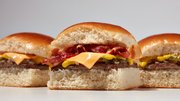News
Skinner: CSPI Happy Meal suit threat frivolous
July 7, 2010
McDonald's CEO Jim Skinner sent a letter Wednesday to the Center for Science in the Public Interest responding to the agency's threat to sue the quick-serve burger giant over its Happy Meal toys. In the letter he addresses what he says is "inflammatory rhetoric" and misinformation about the chain's Happy Meals, which the chain does not intend to stop selling.
CSPI sent a letter to McDonald's in June threatening to sue the corporation if it continued to use toys to lure small children into its restaurants to eat what it considers unhealthy meals. According to the nonprofit health advocate organization's research, all 24 possible Happy Meal combinations exceed 430 calories, which is one-third of the 1,300- calorie recommended daily intake for children 4 to 8 years old.
Skinner said McDonald's is open to meaningful dialogue with the organization but will not be moved by CSPI's scare tactics. Instead, the company will continue its tradition of listening to its customers, which has resulted in its greatest number of menu options ever in the chain's history.
At McDonald's, we listen to what our customers tell us. For the past 30 years they have told us — again, overwhelmingly — that they approve of our Happy Meal program. Three decades provide a lot of listening time. That's why we are confident that parents understand and appreciate that Happy Meals are a fun treat, with right-sized, quality food choices for their children. ...
As chief executive officer of McDonald's, I want you to know we will vigorously defend our brand, our reputation, our food and our people. CSPI is wrong in its assertions, and frivolous in its legal threats. McDonald's has proudly evolved both our menu and marketing practices and will continue to respond to our customers' needs. We have more choice and variety than ever before in our Happy Meals and across our menu. Furthermore, McDonald's makes available in-depth, comprehensive nutrition information about our food to give parents the support they need to make appropriate choices for their children.
Children's well-being requires an ongoing effort and commitment to be a part of the solution. Going forward, we will continue to make more changes that are relevant to our customers and in their best interests, as we always have.
The letter also cited McDonald's history of contributing to children's causes, particularly by its Ronald McDonald House Charities.
Referring to consumer support for McDonald's Happy Meals posted throughout the blogosphere and on social media channels, Skinner said that consumers disagree with CSPI's stance.
In the days following the June 22 letter, consumers were flooding CSPI's Facebook page with posts denigrating the organization for its anti-Happy Meal campaign, but many of those posts are now gone, as one post points out: "Don't waste your time speaking out guys and gals. Our posts our being deleted by the page admin. Time to start a group for people against the recent acts of the CSPI?"
Skinner says in his letter that McDonald's customer service line has been busy with calls after news of the threatened suit reached consumers, "with more than nine out of 10 customers disagreeing with your agenda." Instead, "parents, in particular, strongly believe they have the right and responsibility to decide what's best for their children, not CSPI. It really is that simple."
Skinner also accuses CSPI of purposefully skewing its research results by using the "highly conservative 1,300 calorie per day requirement," saying it "generally applies to the youngest and most sedentary children."
Update: Stephen Gardner, CSPI litigation director, issued the following response to Skinner's letter:
We're encouraged to read that McDonald's is signalling a willingness to make changes that are in the best interests of its customers. We hope that McDonald's takes us up on our offer to negotiate an end to the practice of using toys to market unhealthful foods directly to children. If it doesn't, that will all but guarantee that we will have to resort to litigation.
 ChatGPT
ChatGPT Grok
Grok Perplexity
Perplexity Claude
Claude








